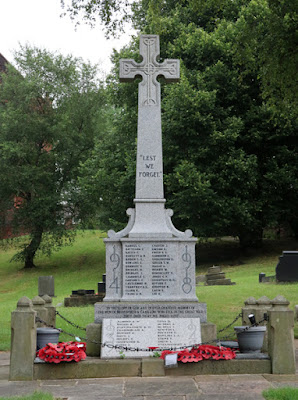 |
| The Brinsworth and Canklow War Memorial |
After a weekend spent exploring the historic architecture of Burngreave, the geology of Parkwood Springs and Sheffield Board Schools in the Sheffield S9 postal district, the next time I went out with my camera was for a brief visit to St. George’s churchyard in Brinsworth, Rotherham.
A couple of years earlier, during the coffee morning at St. Helen’s church in Treeton, someone had mentioned that the Friends of St. George’s Churchyard had plans to restore a granite Boer War Memorial that had been decaying and subjected to vandalism.
Knowing that I had a background in building restoration and had an interest in such things, I was asked if I could recommend someone who could restore it. Not having any connection with memorial masons in the region, I made some enquiries and passed on my findings to the person concerned, but I heard nothing more about it.
I had only visited the churchyard once, a few years before, to have a look at the disused and rather dilapidated St. George's church that I had passed by very often when on the bus to Rotherham. Having had to attend a dental appointment in the vicinity, I decided to pass the time when waiting for my bus back to Treeton by going to have a look at it.
Spending only enough time to take a few photographs of the memorial, which will be dramatically improved if the funding is obtained to clad the existing plinth in granite, add a new granite spire and a post and chain surround, I then had a look at the other memorials in the churchyard.
The Friends of St George's Churchyard have made a great effort to improve the churchyard since being formed in 2011, with a new flagstone path and surround improving access to the Brinsworth and Canklow war memorial, as well as lighting being installed, since my last visit.
The Grade II Listed war memorial, which is in the form of a Latin cross with knotwork detailing, was unveiled in 1929 with a dedication by the Bishop of Sheffield. It is made of Scottish grey granite and was built by Tyas and Guest of Swinton, who also built other memorials that I had seen at Maltby, Laughton-en-le-Morthen and Conisbrough and whose old premises I had encountered during a recent exploration of Swinton.
When I visited in 2016, I didn’t take much notice of the various graves and memorials in the churchyard, but this time I was interested to see that it contained a few Commonwealth War Graves, which I had become interested in since encountering several of them at Burngreave Cemetery a couple of months earlier.
The majority are made of Portland stone, one of which has been stained red where in contact with soil derived from the underlying Rotherham Red sandstone, with the other being Botticino marble. Of more interest on this occasion, however, was the regimental crest of the Reconnaissance Corps, which I had not encountered before and appears to have been deliberately damaged.









No comments:
Post a Comment